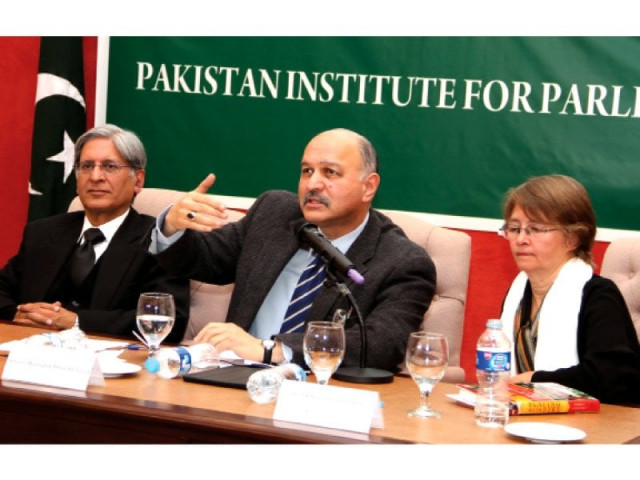Construing nationhood: Casting a critical lens at the security situation and political culture
Speakers at a seminar chart institutional progress in the country.

Senator Mushahid Hussain speaks at a seminar defence development and democracy. PHOTO: EXPRESS
One of the indubitable strengths of Pakistanis is their resilience, their interminable will to combat challenges and overcome them.
This was said by Senate Standing Committee on Defence Chairman Senator Mushahid Hussain on Friday. Hussain was speaking at a seminar, “Pakistan in 21st Century: Defence, Development and Democracy,” which also served as a platform for the book launch of “Playing with Fire” at the Pakistan Institute of Parliamentary Services.
In his welcome note, Hussain said, “Many of our national failings are attributable to being trapped in an outmoded mindset and this is what we are trying to change.”
He concluded on a positive note by highlighting the five recent transitions that took place, including newly-elected governments, a new army chief and chief justice. “These were wholly independent transitions, beautifully executed and this is where the hope comes from.” Pakistan is definitely moving ahead in the right direction, he added.

A senior correspondent of The Washington Post and author of “Playing with Fire,” Constable discussed her book which presents an analysis of the various paradoxes and conflicts confronting Pakistan, which encompass the military establishment, Taliban, politicians, Sufis and shrines, poignantly graduating downwards to the common man and his expectations, lack of trust in the system and a sense of powerlessness and alienation. “This schism between the people and the state is the reason why radical Islam has gained popular appeal in the country,” she said.
With reference to Constable’s book, columnist Ayaz Amir commented that the book beautifully accounts for the reasons for the deterioration of the state, however, a holistic historical narrative of the centuries of chaos following the decline of the Mughal era could elucidate the subject. He said Pakistan is a victim of its larger geography which entangled it in the war against the Soviets, the current fallout being a direct consequence.
Drawing upon patriarchy in Pakistani society, as highlighted by the author, civil society activist Fouzia Saeed stated that this mindset was also rooted in fundamentalism. However, she expressed her optimism in the processes of change which are under way, arguing that analyses like Constable’s are crucial for initiating them.
The concise reporting style of Constable’s book was also appreciated by Senator Aitzaz Ahsan, as it presented a collage of episodes from wide-ranging happenings of recent years. Elaborating on the topic, he highlighted the gradual yet definitive conversion of Pakistan from a welfare state in 1947, to a national security state by the 1960s.
He also appreciated the part played by civil society in actively making inroads for change, as well as the role of democratic institutions, the judiciary and people, which would ultimately succeed in establishing the rule of law.
Published in The Express Tribune, January 4th, 2014.



















COMMENTS
Comments are moderated and generally will be posted if they are on-topic and not abusive.
For more information, please see our Comments FAQ